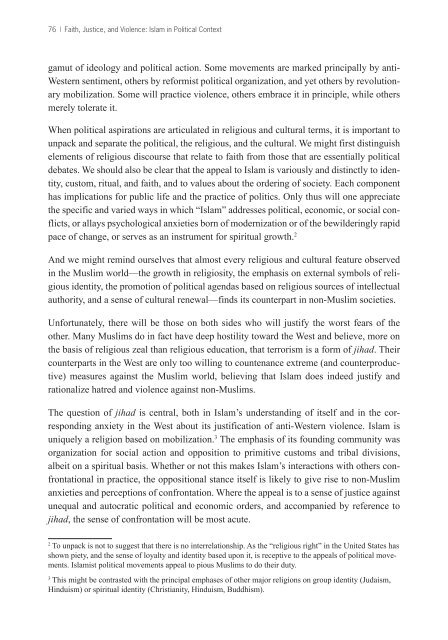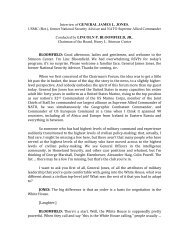Islam and Politics - The Stimson Center
Islam and Politics - The Stimson Center
Islam and Politics - The Stimson Center
You also want an ePaper? Increase the reach of your titles
YUMPU automatically turns print PDFs into web optimized ePapers that Google loves.
76 | Faith, Justice, <strong>and</strong> Violence: <strong>Islam</strong> in Political Context<br />
gamut of ideology <strong>and</strong> political action. Some movements are marked principally by anti-<br />
Western sentiment, others by reformist political organization, <strong>and</strong> yet others by revolutionary<br />
mobilization. Some will practice violence, others embrace it in principle, while others<br />
merely tolerate it.<br />
When political aspirations are articulated in religious <strong>and</strong> cultural terms, it is important to<br />
unpack <strong>and</strong> separate the political, the religious, <strong>and</strong> the cultural. We might first distinguish<br />
elements of religious discourse that relate to faith from those that are essentially political<br />
debates. We should also be clear that the appeal to <strong>Islam</strong> is variously <strong>and</strong> distinctly to identity,<br />
custom, ritual, <strong>and</strong> faith, <strong>and</strong> to values about the ordering of society. Each component<br />
has implications for public life <strong>and</strong> the practice of politics. Only thus will one appreciate<br />
the specific <strong>and</strong> varied ways in which “<strong>Islam</strong>” addresses political, economic, or social conflicts,<br />
or allays psychological anxieties born of modernization or of the bewilderingly rapid<br />
pace of change, or serves as an instrument for spiritual growth. 2<br />
And we might remind ourselves that almost every religious <strong>and</strong> cultural feature observed<br />
in the Muslim world—the growth in religiosity, the emphasis on external symbols of religious<br />
identity, the promotion of political agendas based on religious sources of intellectual<br />
authority, <strong>and</strong> a sense of cultural renewal—finds its counterpart in non-Muslim societies.<br />
Unfortunately, there will be those on both sides who will justify the worst fears of the<br />
other. Many Muslims do in fact have deep hostility toward the West <strong>and</strong> believe, more on<br />
the basis of religious zeal than religious education, that terrorism is a form of jihad. <strong>The</strong>ir<br />
counterparts in the West are only too willing to countenance extreme (<strong>and</strong> counterproductive)<br />
measures against the Muslim world, believing that <strong>Islam</strong> does indeed justify <strong>and</strong><br />
rationalize hatred <strong>and</strong> violence against non-Muslims.<br />
<strong>The</strong> question of jihad is central, both in <strong>Islam</strong>’s underst<strong>and</strong>ing of itself <strong>and</strong> in the corresponding<br />
anxiety in the West about its justification of anti-Western violence. <strong>Islam</strong> is<br />
uniquely a religion based on mobilization. 3 <strong>The</strong> emphasis of its founding community was<br />
organization for social action <strong>and</strong> opposition to primitive customs <strong>and</strong> tribal divisions,<br />
albeit on a spiritual basis. Whether or not this makes <strong>Islam</strong>’s interactions with others confrontational<br />
in practice, the oppositional stance itself is likely to give rise to non-Muslim<br />
anxieties <strong>and</strong> perceptions of confrontation. Where the appeal is to a sense of justice against<br />
unequal <strong>and</strong> autocratic political <strong>and</strong> economic orders, <strong>and</strong> accompanied by reference to<br />
jihad, the sense of confrontation will be most acute.<br />
2<br />
To unpack is not to suggest that there is no interrelationship. As the “religious right” in the United States has<br />
shown piety, <strong>and</strong> the sense of loyalty <strong>and</strong> identity based upon it, is receptive to the appeals of political movements.<br />
<strong>Islam</strong>ist political movements appeal to pious Muslims to do their duty.<br />
3<br />
This might be contrasted with the principal emphases of other major religions on group identity (Judaism,<br />
Hinduism) or spiritual identity (Christianity, Hinduism, Buddhism).

















